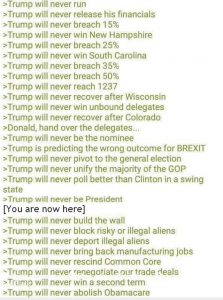As the end of 2016 is quickly approaching, it is time to reflect on the past year. For people working in large bureaucratic organizations like banks and government, this means filling out performance evaluations. Organizations collect these records of their employees’ professional histories. Managers can use old reviews to motivate (non) promotions of their subordinates.
One intriguing aspect is the fact that employees are expected to write negative things about themselves. In management speak this is called “opportunities for growth” or some other bullshit term. But basically the writers have to incriminate themselves. The self-evaluation provides the proverbial rope for somebody to hang them with.
This reminded me about something I read in a book1 by historian Orlando Figes on the Soviet Union. Members of the Communist Party had to write an autobiography which was regularly updated. The higher-ups in the hierarchy could use these documents to control their underlings and their rivals.
The more you think about it, the more parallels there are between modern business life and Soviet society.
It is well known that corporations are not democracies nor markets. But this post focusses on the cultural similarities that caught my attention. Continue reading “Annual reviews and other Soviet business practices”

